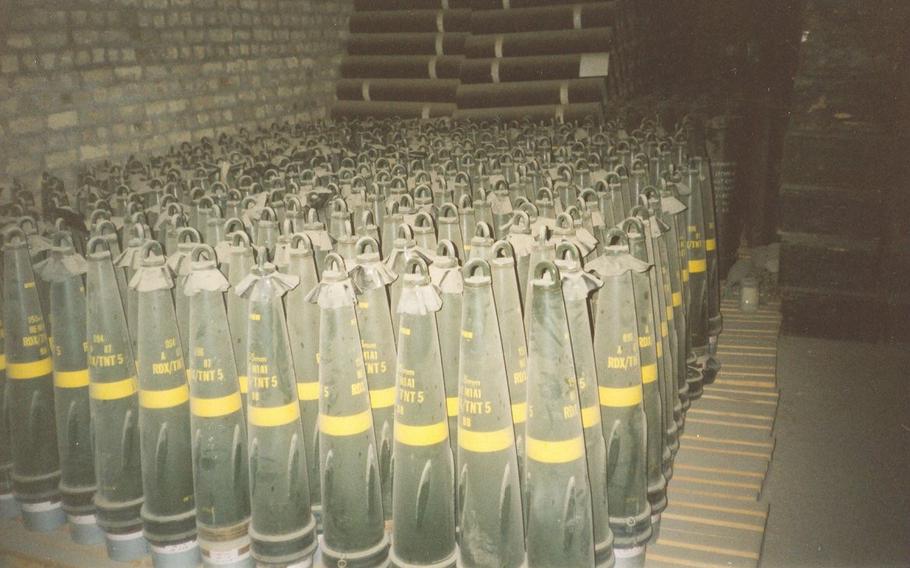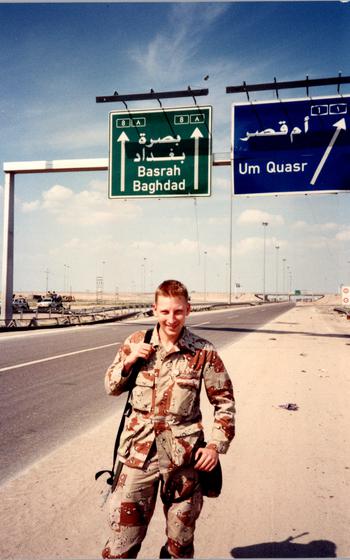
Chemical weapons are stacked inside a munitions depot in Khamisiyah, Iraq, that the military destroyed in 1991. Veterans exposed to chemical plumes from the depot’s destruction are seeking classified documents on the first Gulf War. (Ronald Brown)
WASHINGTON — A group of veterans and their advocates are pushing the Defense Department to declassify tens of thousands of documents from the first Gulf War with the aim of finding clues to the potential toxic exposures of more than 100,000 troops from the military’s demolition of a chemical weapons complex in southern Iraq.
But their demands for the release of all classified documents from the Gulf War, which are stored in the National Archives, are reviving a contentious issue over the destruction in 1991 of a major weapons depot in the Khamisiyah region that the military found later contained chemical weapons.
“We believe the remaining [classified] documents on the first Gulf War may hold information researchers need to find a cure for Gulf War illness or at the very least improve treatments. But these documents have never been seen outside the intelligence community,” said Ronald Brown, a former Army specialist who served in the Gulf War and is helping to lead the effort.
There are more than 1 million classified documents that might contain information on potential health effects to troops from chemical weapons exposure in the first Gulf War, according to GulfLINK, a website created by the Defense Department. But only about 46,000 of those documents have been released.
The Government Accountability Office in 2004 published an investigation of the large-scale demolition operation at Khamisiyah and questioned the accuracy of the Defense Department’s projections about the path of the chemical plume and which troops were affected.
Brown and other veterans met in June with members of the Defense Health Agency in Virginia that manages the military’s global health system. They did so after sending a letter to President Donald Trump’s administration asking for help.
Brown said agency leaders pledged to work with the veterans.
“My team and I are eager to continue discussions [about] Khamisiyah and potential deployment-related exposures and to describe Department of Defense’s collaborative lines of effort to address past exposures, mitigate future hazards, and protect the health of our forces and veterans,” according to a letter to veterans from Tracie Lattimore, acting deputy assistant undersecretary of defense for health readiness policy and oversight.
Gulf War illness is a term to describe “medically unexplained chronic symptoms” experienced by some veterans who served in the Gulf War, according to the Department of Veterans Affairs. Chronic medical problems commonly reported by veterans include fatigue, joint pain, respiratory problems, headaches and gastrointestinal issues.
Brown said the Defense Department previously had stopped responding to the veterans’ requests for information in 2020 until he and other veterans sent letters in February to Trump and Defense Secretary Pete Hegseth.

Ronald Brown, a former Army specialist, took photos of mushroom clouds that resulted from the demolition of a munitions depot in Khamisiyah, Iraq, in 1991. “The first time I felt sick was 15 minutes after those demolitions started,” said Brown, whose unit secured the compound prior to the demolition. (Ronald Brown)
“Many of us veterans developed symptoms while in theater that never went away. My symptoms have worsened over the years, and my medical issues have compounded,” said 57-year-old Army veteran Anthony Hardie of Florida, a former staff sergeant who is national director of Veterans for Common Sense.
“Just declassify everything pertaining to the war,” Hardie said. “If the Defense Department has to set limits it will.”
Veterans for Common Sense and the Vietnam Veterans of America are advocacy groups working with Brown and other Gulf War veterans to pressure the Defense Department to declassify the documents.
“Whether [declassifying the documents] reveals something — that remains to be seen. But it is a matter of justice to Gulf War veterans,” said Hardie, who served from 1986 to 1993 with deployments to the Persian Gulf. “This is important to a huge cohort of veterans who feel gaslit and abandoned by the DOD.”
James McCormick, executive director of government affairs at Vietnam Veterans of America, said his organization stepped in to advocate for the Gulf War veterans as a group because they do not have a major advocacy organization of their own. He said VVA has been providing assistance since 2016 to Gulf War veterans seeking information about chemical weapons releases connected to the destruction of weapons depots in Iraq.
“This is a role that Vietnam Veterans of America has taken on and invested in through funds, advocacy and seriously taking to heart the founding principle of VVA — ‘Never again will one generation of veterans abandon another,’ ” McCormick said.
The veterans and their advocates also are asking for notification letters to be sent to veterans who served in the Khamisiyah region about their exposure risks and for the VA to work with the Defense Department to provide medical exams.
“Representatives from the DOD office of the assistant secretary of defense for health affairs have been in correspondence with, and recently met with, representatives from the Vietnam Veterans of America to discuss topics associated with findings on demolitions involving Iraqi chemical weapons at Khamisiyah, Iraq, in 1991,” the Defense Department said Monday.
“The DOD is committed to providing up-to-date health risk communications to DOD personnel and veterans. Similarly, the DOD works closely with the Department of Veterans Affairs to coordinate and collaborate, as needed, to help facilitate veterans’ access to all appropriate care and benefits available to them,” the Defense Department said in a written statement.
The VA said the agency and research organizations continue to evaluate possible causes of Gulf War veterans’ chronic multi-symptom illnesses, including chemical and biological weapons.
Brown said a large volume of documents from the Gulf War declassified in 1995 indicated the existence of interview transcripts with service members after the destruction of the weapons depot at Khamisiyah. He said the publicly released documents also showed chemical sampling was done, but the results were redacted.
“We would like to see the interview transcripts and the results from the chemical sampling,” Brown said. “We’re hoping to find that in the additional documents. There’s got to be a paper trail.”
But Kirt Love of Texas, a 61-year-old disabled Gulf War veteran, said he is doubtful the declassification of additional Gulf War documents will provide more information about toxins released from the destruction of chemical weapons.
“The Defense Department continues to stall and I’m not confident they will change. Gulf War veterans have been made into the problem child no one wants to deal with,” he said. “It’s a tactic to shut us up.”

“Many of us veterans developed symptoms while in theater that never went away. My symptoms have worsened over the years, and my medical issues have compounded,” said 57-year-old Army veteran Anthony Hardie of Florida, a former staff sergeant who is national director of Veterans for Common Sense. Hardie is shown in southern Iraq in 1991 at the end of the Operation Desert Storm’s ground war. (Anthony Hardie)
Brown, 57, said he began to feel sick in March 1991, 15 minutes after the demolitions started.
“I came home sick and the problems continue,” said Brown, who took photos of the mushroom clouds that plumed from the destruction.
He continues to have breathing problems and other medical issues that doctors struggle to treat.
“This has been going on for 34 years,” said Brown, who has a 100% disability rating from the VA connected to environmental exposures in the Gulf War.
It took him 13 years to get the VA to acknowledge his illnesses were connected to his Gulf War service, he said.
“I had to fight like hell. There were a lot of denials and appeals. There’s nothing that will fix my health problems,” Brown said. “But this group of veterans struggle to have their problems recognized and their voices heard.”